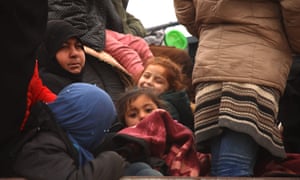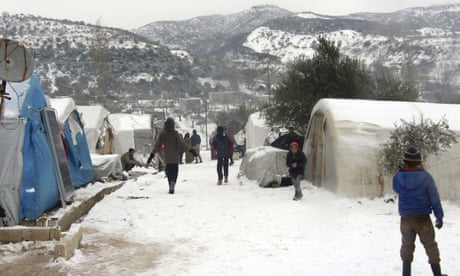The highway that determines the future for Syria and its citizens
900,000 have fled up the M5 in search of safety as Assad tries to regain last rebel stronghold
Bethan McKernan Middle East correspondent Thu 20 Feb 2020

The population of Idlib has grown from 1 million
to 3 million as people have arrived trying to from
Syrian troops.
Photograph: Aaref Watad/AFP via Getty Images
It was dawn when the Hussein family packed up to leave their home in Saraqeb. The whine of Russian and Syrian government warplanes had got too close for comfort in the last few days, and the thuds of bombs and artillery fire were scaring Odai al-Hussein’s 7-month-old son, Yahya.
Odai and his wife Banan spent two weeks agonising over whether to leave home and take Syria’s M5 highway north, into the unknown. But in the end, the looming violence of Bashar al-Assad’s new campaign against Idlib, the last rebel stronghold in the country, led them to pack up the car. Hussein’s father cried as he bid farewell to his house.
The family joined 900,000 others who have made their way up the highway in the largest displacement of people to date in Syria’s long war. For civilians who now have nowhere else to flee, the northbound M5 was the route to relative safety. Now totally under the control of Assad’s forces, the highway is instead the regime’s road to victory.

The M5, or Syria’s “international road”, threads all of Syria’s major cities and six provinces together. The 450km (280 miles) artery joins the political capital Damascus to the economic centre of Aleppo. Stretching as far as Turkey in the north and the southern Jordanian border, which then linked Syria to the Gulf states, the M5 was essential for the movement of wheat and cotton, carrying an estimated $25m in goods and commodities every day before the war broke out in 2011.
Recapturing the M5 has always been a high priority for Assad. Sections of the vital highway have been in the hands of opposition and jihadist fighters for the last eight years, but with Russia’s help, the Syrian government has slowly clawed back control since 2014, emptying towns and cities along the route via a series of blistering air campaigns and sieges.
By the summer of 2018, Idlib, a rural farming province in the country’s northeast, was the only part of Syria out of Assad’s control. The population of the city of Idlib and the surrounding countryside has swollen from 1 million to approximately 3 million as people afraid to wait for regime troops to arrive in their neighbourhoods have fled north in wave after wave of displacement.
Even though the area was protected by a de-escalation deal brokered by Turkey – which backs some opposition groups – and Assad’s allies in Moscow, part of the M5 cuts through the Idlib countryside. And in December, Damascus launched a ferocious new campaign to recapture the last slivers of the road, finally taking the last rebel-controlled section around the village of Khan al-Assal last week.

Families trapped by Assad’s assault on Idlib fight to survive in the snow
The regime victory has come at a high price for civilians. Bumper-to-bumper traffic has clogged the M5 and other roads leading north towards the closed Turkish border, those who can afford the fuel fleeing in cars, motorbikes and flatbed trucks, often taking no more than what they can carry.
Even these escape routes have become hazardous options: sniper and artillery fire targeting civilian convoys has killed at least 15 people. So far, the regime campaign has killed more than 300 in bombings that have hit medical facilities, bakeries and other civilian infrastructure in the last three months. Footage has emerged on social media of regime troops allegedly desecrating graves in newly-retaken rebel towns.
Regaining full control of the M5 is a major victory for Assad, according to Danny Makki, a Syrian analyst. “The highway’s recapture will inevitably galvanise the Assad government both economically and strategically, despite the losses they have suffered in men and equipment in their numerous attempts to secure it,” he said.
“It also alleviates the logistical nightmare of supplying Aleppo and Syria’s embattled north, which has relied on reinforcements and supplies through dangerous and poorly-maintained alternatives.”
Play Video
0:34 Footage shows displaced people ransacking an aid warehouse in north-west Syria – video
The Syrian president himself made a rare televised address on Tuesday following the capture of the road, congratulating his troops and vowing to press ahead with the campaign.
“This liberation does not mean the end of war and it does not mean… our enemies will surrender,” he said.
“But it means that we rubbed their noses in the dirt as a prelude for complete victory and ahead of their defeat sooner or later. We should not rest, but continue to prepare for coming battles.”
For the 3 million civilians cowering in Idlib, his words carry a terrifying weight. The situation is already desperate, with the UN and aid agencies warning the area could face “the worst humanitarian disaster of the century”. Turkish attempts to repel the regime advance with an influx of 12,000 troops have so far led to nothing.
Aid response efforts are at breaking point. On Wednesday footage emerged on social media of displaced people tired of waiting ransacking an aid warehouse and grabbing what they can. Hundreds of thousands more are camped out in tents and other substandard accommodation on the Turkish border in freezing winter conditions, begging Turkish soldiers to open the border.
Hussein counts himself and his family as lucky: they have managed to find an unfurnished apartment in Azaz, which is under Turkish control, although they are already longing to go home.
“I heard that regime soldiers set fire to the houses of those who oppose the regime in Saraqeb and I saw pictures of soldiers looting. Our future is unclear,” Hussein said.
“I don’t think I am afraid to die in the war, in bombing. But I know for certain I can never live alongside the men who fight for Assad – the animals who have done this to us.”
It was dawn when the Hussein family packed up to leave their home in Saraqeb. The whine of Russian and Syrian government warplanes had got too close for comfort in the last few days, and the thuds of bombs and artillery fire were scaring Odai al-Hussein’s 7-month-old son, Yahya.
Odai and his wife Banan spent two weeks agonising over whether to leave home and take Syria’s M5 highway north, into the unknown. But in the end, the looming violence of Bashar al-Assad’s new campaign against Idlib, the last rebel stronghold in the country, led them to pack up the car. Hussein’s father cried as he bid farewell to his house.
The family joined 900,000 others who have made their way up the highway in the largest displacement of people to date in Syria’s long war. For civilians who now have nowhere else to flee, the northbound M5 was the route to relative safety. Now totally under the control of Assad’s forces, the highway is instead the regime’s road to victory.

The M5, or Syria’s “international road”, threads all of Syria’s major cities and six provinces together. The 450km (280 miles) artery joins the political capital Damascus to the economic centre of Aleppo. Stretching as far as Turkey in the north and the southern Jordanian border, which then linked Syria to the Gulf states, the M5 was essential for the movement of wheat and cotton, carrying an estimated $25m in goods and commodities every day before the war broke out in 2011.
Recapturing the M5 has always been a high priority for Assad. Sections of the vital highway have been in the hands of opposition and jihadist fighters for the last eight years, but with Russia’s help, the Syrian government has slowly clawed back control since 2014, emptying towns and cities along the route via a series of blistering air campaigns and sieges.
By the summer of 2018, Idlib, a rural farming province in the country’s northeast, was the only part of Syria out of Assad’s control. The population of the city of Idlib and the surrounding countryside has swollen from 1 million to approximately 3 million as people afraid to wait for regime troops to arrive in their neighbourhoods have fled north in wave after wave of displacement.
Even though the area was protected by a de-escalation deal brokered by Turkey – which backs some opposition groups – and Assad’s allies in Moscow, part of the M5 cuts through the Idlib countryside. And in December, Damascus launched a ferocious new campaign to recapture the last slivers of the road, finally taking the last rebel-controlled section around the village of Khan al-Assal last week.

Families trapped by Assad’s assault on Idlib fight to survive in the snow
The regime victory has come at a high price for civilians. Bumper-to-bumper traffic has clogged the M5 and other roads leading north towards the closed Turkish border, those who can afford the fuel fleeing in cars, motorbikes and flatbed trucks, often taking no more than what they can carry.
Even these escape routes have become hazardous options: sniper and artillery fire targeting civilian convoys has killed at least 15 people. So far, the regime campaign has killed more than 300 in bombings that have hit medical facilities, bakeries and other civilian infrastructure in the last three months. Footage has emerged on social media of regime troops allegedly desecrating graves in newly-retaken rebel towns.
Regaining full control of the M5 is a major victory for Assad, according to Danny Makki, a Syrian analyst. “The highway’s recapture will inevitably galvanise the Assad government both economically and strategically, despite the losses they have suffered in men and equipment in their numerous attempts to secure it,” he said.
“It also alleviates the logistical nightmare of supplying Aleppo and Syria’s embattled north, which has relied on reinforcements and supplies through dangerous and poorly-maintained alternatives.”
Play Video
0:34 Footage shows displaced people ransacking an aid warehouse in north-west Syria – video
The Syrian president himself made a rare televised address on Tuesday following the capture of the road, congratulating his troops and vowing to press ahead with the campaign.
“This liberation does not mean the end of war and it does not mean… our enemies will surrender,” he said.
“But it means that we rubbed their noses in the dirt as a prelude for complete victory and ahead of their defeat sooner or later. We should not rest, but continue to prepare for coming battles.”
For the 3 million civilians cowering in Idlib, his words carry a terrifying weight. The situation is already desperate, with the UN and aid agencies warning the area could face “the worst humanitarian disaster of the century”. Turkish attempts to repel the regime advance with an influx of 12,000 troops have so far led to nothing.
Aid response efforts are at breaking point. On Wednesday footage emerged on social media of displaced people tired of waiting ransacking an aid warehouse and grabbing what they can. Hundreds of thousands more are camped out in tents and other substandard accommodation on the Turkish border in freezing winter conditions, begging Turkish soldiers to open the border.
Hussein counts himself and his family as lucky: they have managed to find an unfurnished apartment in Azaz, which is under Turkish control, although they are already longing to go home.
“I heard that regime soldiers set fire to the houses of those who oppose the regime in Saraqeb and I saw pictures of soldiers looting. Our future is unclear,” Hussein said.
“I don’t think I am afraid to die in the war, in bombing. But I know for certain I can never live alongside the men who fight for Assad – the animals who have done this to us.”
No comments:
Post a Comment